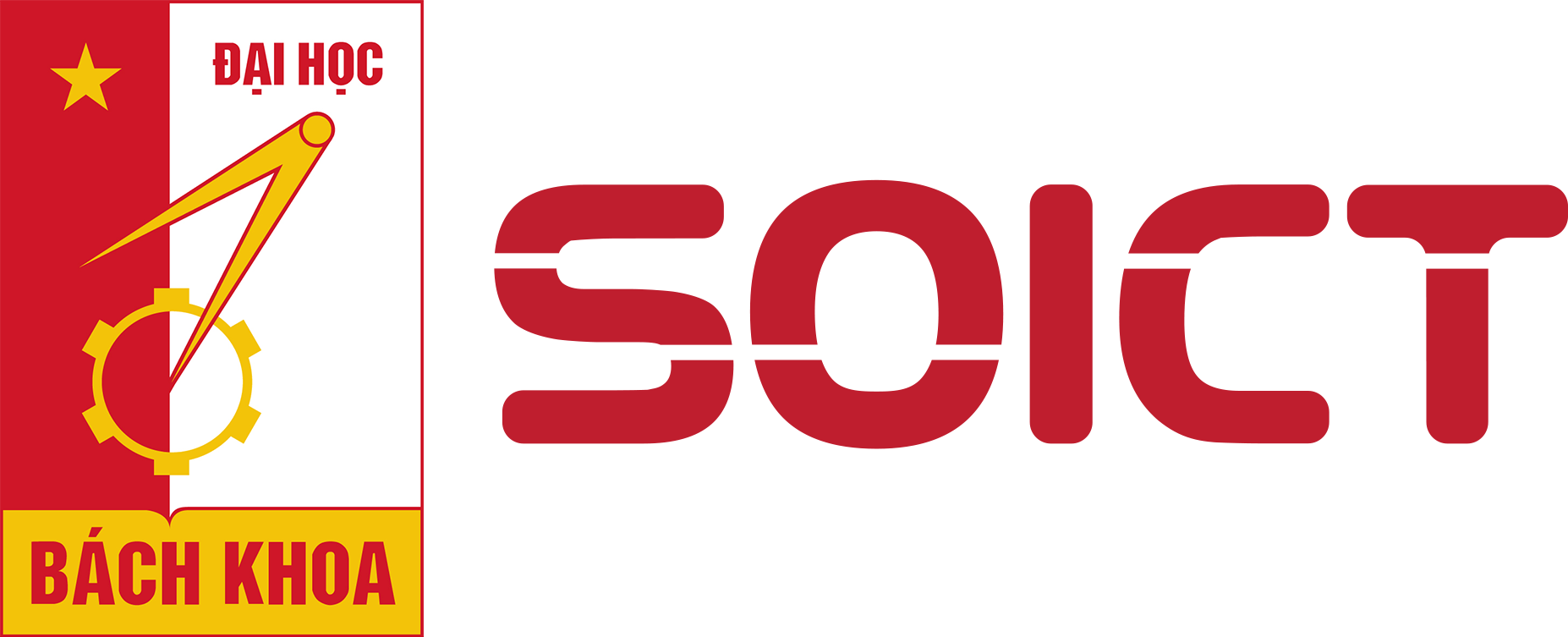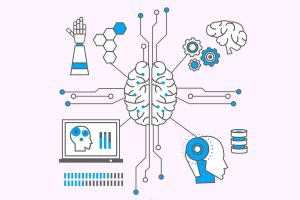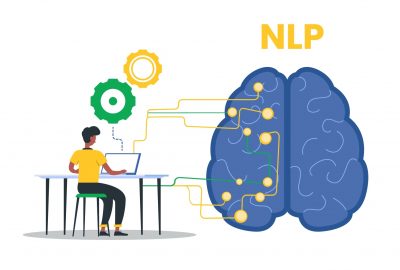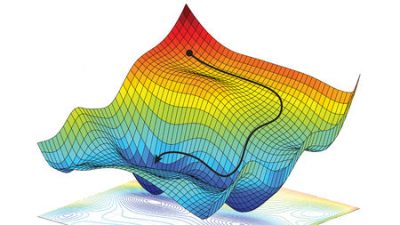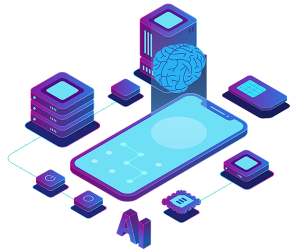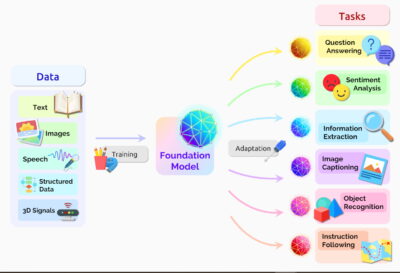Introduction
Today, with many IoT devices and the development of Internet technologies, both wired and wireless connectivity play a crucial role in offering a wide range of services to end-users. Moreover, such communication and networking technologies have influenced individuals, institutions, governments, and industries. As a result, communication technologies have become an indispensable part of daily life. Recently, Machine Learning (ML) technologies have achieved breakthrough advances. When combined with communication technologies, the achievement in AI has created unique applications such as smart cities, self-driving cars, etc.
Our research group focuses on the study and development of high-speed, dependable, and flexible networking technologies, using theoretical and practical techniques to incorporate social, information, device, and energy factors. We study to leverage AI in enhancing and optimizing network performance. We’re also looking into solutions for analyzing and mining data collected by IoT devices. See the slides here for more detail.
Contact: Dr. Nguyen Phi Le, Email: lenp@soict.hust.edu.vn
Group website: http://icn.bkai.ai/
Research Directions
- Network optimization: Exploiting machine learning, deep learning, reinforcement learning, meta-heurisctic techniques to optimize network performance.
- Data mining in IoT networks: Focusing on processing, analyzing and mining data collected from IoT devices.
- AI in networking: Applying various machine learning and deep learning techniques including graph networks, deep reinforcement learning, etc., to analyze and predict the network behavior. Leveraging AI in controlling network operations.
- Distributed systems: Addressing different problems in distributed systems such as Synchronization, Replication and Consistency, Fault tolerance, etc.
- New generation network: Solving problems of NGN in expanding the existing access network infrastructure into networks capable of satisfying the user’s requirements.
- QoS-QoE: Proposing adaptive mechanisms to predict and optimize QoS/QoE in network systems.
- Internet of Things: Addressing different issues of IoT systems such as security problems, lack of regulation, limited bandwidth, etc.
Research problems
- Optimization problems in Wireless Rechargeable Sensor Networks: We focus on a new wireless charging paradigm that considers a variety of factors such as charging path, charging time, target coverage, and connectivity. Furthermore, our system considers various optimization goals, including minimizing the number of mobile chargers, optimizing the depot placement, and extending the network lifetime. To solve the problem, we go from theoretical modeling to applying state-of-the-art technologies. Specifically, we leverage reinforcement learning and deep reinforcement learning, fuzzy logic, genetic algorithms to propose novel charging algorithms for wireless rechargeable IoT networks.
- Mobile air quality monitoring network: This research topic, part of the VinIF-funded Fi-Mi project (http://fi-mi.vn), presents a new mobile air quality monitoring network based on vehicle-mounted sensors. We explore various research issues, such as resource allocation, effective communication, data analysis, and data mining. The resource allocation problem is solved using optimization techniques such as reinforcement learning, fuzzy logic, and meta-heuristics. A mathematical model for opportunistic communication in mobile air quality monitoring networks is also proposed. We then leverage deep reinforcement learning for offloading data from devices to the servers. Finally, we use machine learning methodologies to calibrate the acquired data and propose deep learning models for spatiotemporal prediction problems.
- Satellite precipitation calibration: We investigate a fascinating research problem that is how to calibrate the satellite precipitation data. Our method uses deep learning techniques to blend satellite data that is fine-grained but inaccurate with the coarse-but-accurate data from ground-based monitoring stations. We then leverage graph neural networks to model the spatial correlation between the ground-based monitoring stations. Besides, recurrent neural networks are utilized to capture the data’s temporal properties.
- Prediction of water levels on rivers in Vietnam: This study focuses on data mining regarding river discharge and water levels in Vietnam. For hydrological research and flood prediction, forecasting river discharge and water levels have long been necessary. However, existing machine learning-based methods cope with severe flaws such as a lack of training data, noise in the obtained data, and the difficulty of altering the model’s hyper-parameters. In this research, we address at the same time these three challenges. Specifically, we apply data preprocessing techniques such as SSA to clean the data before feeding it into the forecasting models. Furthermore, we propose novel deep learning models that employ ensemble learning techniques and graph neural networks to capture both temporal and spatial correlation and extract relevant information from historical data. Furthermore, optimization techniques like metaheuristics are used to obtain the optimal hyper-parameters automatically.
- Traffic prediction and intelligent routing: In this research, we study how to learn and predict networks’ future behavior dynamically. From that, we design algorithms to control the network operations efficiently and intelligently. Several research problems are taking into account, such as exploiting the Graph Neural Networks to capture the spatial relation of the network and then leveraging deep learning to predict the network traffic; using reinforcement learning to guide the packets; utilizing metaheuristic algorithms and linear programming to optimize the routing paths. We perform experiments on network simulators such as OMNET, NS2, and real datasets such as Brain, Abilene, and Geant.
- Applying ML to Software-Defined Network => Knowledge-defined Network: Applying AI to the management of computer networks, making it to be a self-adaptive one. This means every network node will be an AI node, which is able to make decisions automatically. However, these network nodes have only a local view and a local control, hence, applying Artificial Intelligence to each network node is not trivial. For this purpose, a centralized control architecture, e.g. Software-defined Network (SDN), is a promising candidate. In this work, we decide to develop a knowledge layer on top of the SDN architecture, forming a Knowledge-defined Network.
- Replication and consistency in heterogeneous and Distributed SDN networks: Proposing an East-West interface, called SINA, to provide the interoperability of a heterogeneous and distributed SDN network. In addition, a novel Reinforcement Learning-based consistency algorithm is introduced for an adaptive Quorum-based replication mechanism.
- Applying Federated Learning to SDN: The learning phase of a multi-domain SDN network must address the following problems: both solutions of 1) learning separately in each domain and 2) collecting all data from different controllers and launching the training phase in a centralized server are not efficient due to the computational cost, training time, and the accuracy. That motivates us to apply Federated Learning, in which distributed SDN controllers cooperatively train a centralized learning model while do not share the training data for preserving data privacy.
Latest Publications
Publications in 2025
- Phạm Thanh Huyền, Nguyễn Thị Anh Thư, Nguyễn Thanh Hùng, Nguyễn Xuân Quyền. Học bổng thu hút sinh viên giỏi học các ngành khoa học cơ bản, kỹ thuật, công nghệ – Bài học từ các quốc gia phát triển và giải pháp cho Việt Nam. Hội thảo khoa học chính sách xét cấp học bổng, chi phí sinh hoạt cho người học các ngành khoa học cơ bản, kỹ thuật then chốt và công nghệ chiến lược. 52-58. Trường Đại học Sư phạm kỹ thuật TP HCM. 20/06/2025
- Hai-Anh Tran; Cong-Son Duong; Trong-Duc Bui; Van Tong; Huynh Thi Thanh Binh. GAMR: Revolutionizing Multi-Objective Routing in SDN Networks With Dynamic Genetic Algorithms. IEEE Transactions on Emerging Topics in Computational Intelligence. 1 - 15. 15/02/2025
- Cui Wei, Ullah Ismat, Lin Weiming, Zhang Jupei, Chen Zhaowei, Yang Shuyi, Peng Wei, Zhuang Yin, Chen Wenjin, Cao Yi, Zhang Shujun, Jin Shengyang, Yang Liang. Multifunctional Sr2+/Zn2+ Co‐Doped Mesoporous Silica Nanoparticles in Injectable Hydrogel for Ameliorating Osteoporotic Osseointegration. Advanced Healthcare Materials. 15/06/2025
- Nguyen Quang H., Tran Hoang V., Nguyen Huu Tien, Le Phuong T. M., Nguyen Phi Le, Nguyen Binh P.. AIM: an accurate and explainable model for ATAC to GEX translation and pathway analysis. Memetic Computing. 1-12. 23/02/2025
- Thanh Trung Nguyen, Minh Hai Vu, Thi Ha Ly Dinh, Phi Le Nguyen, Kien Nguyen. MuLeS: a Multi-client Learning-based MPQUIC Scheduler. IEEE Consumer Communications & Networking Conference (CCNC). 06/01/2025
- Thai Nguyen, Trung Thanh NGUYEN, Tien Nguyen, Trung Nguyen Thanh, Hieu Pham, Thanh Hung Nguyen, Truong Thao Nguyen, Phi Le Nguyen. CT to PET Translation: A Large-scale Dataset and Domain-Knowledge-Guided Diffusion Approach. IEEE/CVF Winter Conference on Applications of Computer Vision. 28/02/2025
- Tran Giang; Hoang Anh; Bui Tung; Tong Van; Tran Duc. A Deep Learning Approach to Early Identification of Remote Access Trojans. Communications in Computer and Information Science. 445-456. TP. Hồ Chí Minh. 13/12/2024
- Hai Anh Tran, Van Tong. ECODI: a novel evolutionary coreset distillation with LLM-assisted fitness evaluation for encrypted network traffics.. International Journal of Machine Learning and Cybernetics. 03/03/2025
- Tran Giang, Hoang Anh, Bui Tung, Tong Van, Tran Duc. A Deep Learning Approach to Early Identification of Remote Access Trojans. Communications in Computer and Information Science. 445-456. 13/12/2024
- Nguyen Minh Hieu, Huynh Thanh Trung, Nguyen Thanh Toan, Nguyen Phi Le, Pham Hien Thu, Jo Jun, Nguyen Thanh Tam. On-device diagnostic recommendation with heterogeneous federated BlockNets. Science China Information Sciences. 01/04/2025
- Nguyen Manh Duong, Nguyen Dac Thai, Nguyen Trung Viet, Yamada Homi, Pham Huy Hieu, Le Nguyen Phi. Bridging Classification and Segmentation in Osteosarcoma Assessment via Foundation and Discrete Diffusion Models. 2025 IEEE 22nd International Symposium on Biomedical Imaging (ISBI). 1-5. 14/04/2024
- Son Dinh, Dung Nguyen, Duc-Tri Tran, Dang-Huy Pham-Nguyen, Thuan Hieu Tran, Tong Anh, Quang Huy Hoang, Phi Le Nguyen. Sign Language Recognition: A Large-scale Multi-view Dataset and Comprehensive Evaluation. IEEE/CVF Winter Conference on Applications of Computer Vision. 28/03/2025
- Nguyen Son Dinh, Tuan Dung Nguyen, Duc Tri Tran, Nguyen Dang Huy Pham, Thuan Hieu Tran, Ngoc Anh Tong, Quang Huy Hoang, and Phi Le Nguyen. Sign Language Recognition: A Large-scale Multi-view Dataset and Comprehensive Evaluation. WACV 2025– IEEE/CVF Winter Conference. 7876-7886. 28/01/2025
- Vu Bach, Nguyen Hoang, Nguyen Quang Minh, Le Duong, Pham Hieu, Le Nguyen Phi, Nguyen Lam M.. Foundation Model and Temporal Priors-guided Transductive Few-shot Action Recognition. 2025 IEEE International Conference on Acoustics, Speech and Signal Processing (ICASSP 2025). 1-5. 06/04/2025
- Ryan E. Himes, Hai Anh Tran, Truong X. Tran. Leveraging Dynamic Graph Word Embedding for Efficient Contextual Representations. International Symposium on Information and Communication Technology (SOICT24). Da Nang, Vietnam. 13/12/2024
- Van Tong; Cuong Dao; Hai Anh Tran; Duc Tran; Huynh Thi Thanh Binh; Nam-Thang Hoang. Encrypted Traffic Classification Through Deep Domain Adaptation Network With Smooth Characteristic Function. IEEE Transactions on Network and Service Management. 331-343. 24/01/2025
- Dinh Nguyen Son, Nguyen Tuan Dung, Tran Duc Tri, Huy Pham Nguyen Dang, Tran Thuan Hieu, Tong Ngoc Anh, Hoang Quang Huy, Nguyen Phi Le. Sign Language Recognition: A Large-scale Multi-view Dataset and Comprehensive Evaluation. 2025 IEEE/CVF Winter Conference on Applications of Computer Vision (WACV). 7887-7897. 26/02/2024
- Son Duong, Truong X. Tran, Hai Anh Tran. ICARE: cross-domain text classification with incremental class-aware representation and distillation learning.. International Journal of Machine Learning and Cybernetics.. 15/02/2025
- Cuong Dao, Van Tong, Hai Anh Tran, Duc Tran, Giang Nguyen. POSTER: Multimodal Graph Networks for Systematic Generalization in Code Clone Detection. The 20th ACM ASIA Conference on Computer and Communications Security (ACM ASIACCS 2025). Hanoi, Vietnam. 25/08/2025
- Nguyen Dac Thai, Nguyen Trung Thanh, Nguyen Huu Tien, Nguyen Thanh Trung, Pham Huy Hieu, Nguyen Thanh Hung, Truong Thao Nguyen, Le Nguyen Phi. CT to PET Translation: A Large-Scale Dataset and Domain-Knowledge-Guided Diffusion Approach. 2025 IEEE/CVF Winter Conference on Applications of Computer Vision (WACV). 1498-1507. 26/02/2024
Publications in 2024
- Vedant S. Lanjewar; Hai-Anh Tran; Truong X. Tran. Layer-Wise Adaptive Weighting for Faster Convergence in Federated Learning. Information Reuse and Integration for Data Science (IRI 2024). San Jose, CA, USA. 07/08/2024
- Abhinav Vij, Hai-Anh Tran, Truong X. Tran. Trustable Network Intrusion Detection System Through Wisdomnet and Uncertainty Measures. Local Computer Networks Conference (LCN). Caen, Normandy, France. 08/10/2024
- Manh Cuong Dao, Phi Le Nguyen, Thao Nguyen Truong, Trong Nghia Hoang. Incorporating Surrogate Gradient Norm to Improve Offline Optimization Techniques. The Thirty-eighth Annual Conference on Neural Information Processing Systems, NeurIPS 2024. 10/12/2024
- Dong Duc Anh Nguyen, Minh Hieu Nguyen, Phi Le Nguyen, Jun Jo, Hongzhi Yin, Thanh Tam Nguyen. Multi-task Learning of Heterogeneous Hypergraph Representations in LBSNs. The 20th International Conference on Advanced Data Mining and Applications 2024. 161–177. 03/12/2024
- Nguyen Thanh Tam, Huynh Thanh Trung, Ren Zhao, Nguyen Thanh Toan, Nguyen Phi Le, Yin Hongzhi, Nguyen Quoc Viet Hung. Privacy-preserving explainable AI: a survey. Science China Information Sciences. 01/01/2025
- T. K. Lai, and I. L. Ngo. An investigation on the thermo-electrohydraulic performance of novel ECF micro-pump.. International Journal of Heat and Mass Transfer. 29/09/2024
- Thanh Trung Huynh, Trong Bang Nguyen, Thanh Toan Nguyen, Phi Le Nguyen, Hongzhi Yin, Quoc Viet Hung Nguyen, Thanh Tam Nguyen. Certified Unlearning for Federated Recommendation. ACM Transactions on Information Systems. 22/11/2024
- Manh Cuong Dao, Phi Le Nguyen, Thao Nguyen Truong, Trong Nghia Hoang. Boosting Offline Optimizers with Surrogate Sensitivity. ICML. 1-10. áo. 21/07/2024
- Minh Khiem Pham, Phi Le Nguyen, Viet Hung Vu, Thao Nguyen Truong, Hoa Vo-Van, Thanh Ngo-Duc. A Data-driven Approach for High Accurate Spatiotemporal Precipitation Estimation", Neural Computing and Applications Journal. Neural Computing and Applications. 6099–6118. 13/12/2023
- Sikandar Ali Qalati, MengMeng Jiang, Samuel Gyedu, and Emmanuel Kwaku Manu. Do Strong Innovation Capability and Environmental Turbulence Influence the Nexus Between Customer Relationship Management and Business Performance?. Business Strategy and the Environment. 02/07/2024
- Duong Nguyen, Phi Le Nguyen, Truong Nguyen, Hieu Pham, Duc Tran. FedBlock: A Blockchain Approach to Federated Learning against Backdoor Attacks. 2024 IEEE International Conference on Big Data (BigData). 15/12/2024
- Van Tong, Cuong Dao, Hai-Anh Tran, Truong X. Tran, Sami Souihi. Enhancing BERT-based Language Model for Multi-Label Vulnerability Detection of Smart Contract in Blockchain. Journal of Network and Systems Management. 10/05/2024
- T. K. Lai, K. D. Tran, and I. L. Ngo. A numerical study on the thermo-electrohydrodynamic performance of ECF micro-pumps. Sustainability and Emerging Technologies for Smart Manufacturing. 29/04/2024
- Duc Long Nguyen, Phi Le Nguyen, Thao Nguyen Truong. Combating Quality Distortion in Federated Learning with Collaborative Data Selection. Pacific-Asia Conference on Knowledge Discovery and Data Mining. 1-6. Taiwan. 25/04/2024
- Manh Cuong Dao, Phi Le Nguyen, Thao Nguyen Truong, Trong Nghia Hoang. Boosting Offline Optimizers with Surrogate Sensitivity. ICML'24: International Conference on Machine Learning. 21/07/2024
- Van An Le, Nam Duong Tran, Phuong Nam Nguyen, Thanh Hung Nguyen, Phi Le Nguyen, Truong Thao Nguyen, Yusheng Ji. Enhancing the Generalization of Personalized Federated Learning with Multi-head Model and Ensemble Voting. 38th IEEE International Parallel & Distributed Processing Symposium (IPDPS 2024). 205-216. Mỹ. 27/05/2024
- Manh Duong Nguyen, Trung Thanh Nguyen, Huy Hieu Pham, Trong Nghia Hoang, Phi Le Nguyen and Thanh Trung Huynh. FedMAC: Tackling Partial-Modality Missing in Federated Learning with Cross-Modal Aggregation and Contrastive Regularization. The 22nd International Symposium on Network Computing and Applications (NCA 2024). 24/10/2024
- Duy A. Nguyen, Trang H. Tran, Huy Hieu Pham, Phi Le Nguyen, Lam M. Nguyen. Improving Time Series Encoding with Noise-Aware Self-Supervised Learning and an Efficient Encoder. IEEE International Conference on Data Mining. 09/12/2024
- Viet Hung Vu, Duc Long Nguyen, Thanh Hung Nguyen, Nguyen Quoc Viet Hung, Phi Le Nguyen, Huynh Thanh Trung. Self-supervised air quality estimation with graph neural network assistance and attention enhancement. Neural Computing and Applications. 11171–11193. 21/02/2024
- Van Tong, Sami Souihi, Hai Anh Tran, Abdelhamid Mellouk. Troubleshooting Solution for Traffic Congestion Control. Journal of Network and Computer Applications. 16/06/2024
- Duong Nguyen, Phi Le Nguyen, Truong Nguyen, Hieu Pham, and Duc Tran. FedBlock: A Blockchain Approach to Federated Learning against Backdoor Attacks. IEEE BigData. 15/12/2024
- Tuan Dung Nguyen; Ngoc Anh Tong; Binh P. Nguyen; Quoc Viet Hung Nguyen; Phi Le Nguyen; Thanh Trung Huynh. Hierarchical Federated Learning in MEC Networks with Knowledge Distillation. 2024 International Joint Conference on Neural Networks (IJCNN). 1-8. Yokohama, Japan. 30/06/2024
- Minh Hai Vu, Thanh Trung Nguyen, Thi Ha Ly Dinh, Phi Le Nguyen, Kien Nguyen. LoGra: an LSTM-DDPG Integrated MPQUIC Scheduler for Mobile Video Streaming. 2024 IEEE 100th Vehicular Technology Conference (VTC2024-Fall). 1-5. Washington, DC, USA. 07/10/2024
- Ha An Le , Trinh Van Chien , Van Duc Nguyen†,Wan Choi. Channel Analysis and End-to-End Design for Double RIS-Aided Communication Systems with Spatial Correlation and Finite Scatterers. IEEE Conference on Global Communications (GLOBECOM). 1561-1566. Kuala Lumpur, Malaysia. 03/08/2023
- Thanh Trung Huynh, Trong Bang Nguyen, Phi Le Nguyen, Thanh Tam Nguyen, Matthias Weidlich, Quoc Viet Hung Nguyen, Karl Aberer. Fast-FedUL: A Training-Free Federated Unlearning with Provable Skew Resilience. European Conference on Machine Learning and Principles and Practice of Knowledge Discovery in Databases (ECML PKDD 2024). 22/08/2024
- Nguyen Trung Thanh, Le Nguyen Phi, Kawanishi Yasutomo, Komamizu Takahiro, Ide Ichiro. Zero-Shot Pill-Prescription Matching With Graph Convolutional Network and Contrastive Learning. IEEE Access. 55889-55904. 17/04/2024
- JYE Tin, WW Tan, AA Bakar, MS Mahali, FF Lothai, NF Mohammad, SSA Hassan & KF Chin. A Conceptual Design of Sustainable Solar Photovoltaic (PV) Powered Corridor Lighting System with IoT Application. ICREEM 2022. 09/03/2024
- Minh Hieu Nguyen, Thanh Trung Huynh, Thanh Toan Nguyen, Phi Le Nguyen, Hien Pham, Jun Jo, Thanh Tam Nguyen. On-Device Diagnostic Recommendation with Heterogeneous Federated BlockNets. Science China Information Sciences. 1-17. 14/09/2024
- Duy A. Nguyen, Trang H. Tran, Huy Hieu Pham, Phi Le Nguyen, Lam M. Nguyen. Improving Time Series Encoding with Noise-Aware Self-Supervised Learning and an Efficient Encoder. 2024 IEEE International Conference on Data Mining (ICDM). 09/12/2024
- Van An Le, Duc Long Nguyen, Phi Le Nguyen, Yusheng Ji. Traffic Engineering in Large-scale Networks via Multi-Agent Deep Reinforcement Learning with Joint-Training. 2024 33rd International Conference on Computer Communications and Networks (ICCCN). 1-9. Kailua-Kona, HI, USA. 29/07/2024
- Trinh Thi Ha, Nguyen Trung Dung, Nguyen Thanh Huong, Tran Trong An, Pham Van Tuan, Vu Ngoc Hung, Chu Manh Hoang. Investigating the coupling length of two triangle hybrid gap plasmonic waveguides. The International Conference on Advanced Materials and Technology (ICAMT 2024). 10-13. Hanoi. 09/10/2024
- Minh Hai Vu, Thanh Trung Nguyen, Thi Ha Ly Dinh, Phi Le Nguyen, Kien Nguyen. LoGra: an LSTM-DDPG Integrated MPQUIC Scheduler for Mobile Video Streaming. VTC 2024. 07/10/2024
- Son Duong, Tuan Nguyen, Nam-Thang Hoang, Van Tong, Hai-Anh Tran, Giang Nguyen, Abdelhamid Mellouk, Truong Tran. Server and Route Selection Optimization for Knowledge-defined Distributed Network Based on Gambling Theory and LSTM Neural Networks. IEEE Global Communications Conference. 04/12/2023
- Dong Duc Anh Nguyen, Minh Hieu Nguyen, Phi Le Nguyen, Jun Jo, Hongzhi Yin, Thanh Tam Nguyen. Multi-task Learning of Heterogeneous Hypergraph Representations in LBSNs. The 20th International Conference on Advanced Data Mining and Applications 2024. 15/12/2024
- Tống Văn Vạn, Đồng Gang Thép, Chử Minh Hà, Trần Quang Đức. CẢI THIỆN BÀI TOÁN PHÁT HIỆN LỖ HỔNG ĐA NHÃN TRONG HỢP ĐỒNG THÔNG MINH SỬ DỤNG MÔ HÌNH NGÔN NGỮ LỚN. The National Conference on Fundamental and Applied IT Research (FAIR’2024). HỌC VIỆN CÔNG NGHỆ BƯU CHÍNH VIỄN THÔNG, HÀ NỘI. 08/08/2024
- Tuan Dung Nguyen, Thanh Trung Huynh, Minh Hieu Phan, Quoc Viet Hung Nguyen, Phi Le Nguyen. CARER - ClinicAl Reasoning-Enhanced Representation for Temporal Health Risk Prediction. Proceedings of the 2024 Conference on Empirical Methods in Natural Language Processing. 10392–10407. 12/11/2024
- Van Tong, Dao Viet Cuong, Duc Tran. MULTICLONEBERT: A NOVEL SEMANTIC CODE CLONE DETECTION MECHANISM LEVERAGING GRAPH-BASED LARGE LANGUAGE MODEL. The National Conference on Fundamental and Applied IT Research (FAIR’2024). HỌC VIỆN CÔNG NGHỆ BƯU CHÍNH VIỄN THÔNG, HÀ NỘI. 08/08/2024
- Quang Ha Pham, Nguyen Nang Hung, Hieu Pham, Nguyen Thanh-Hung, Truong Thao Nguyen, Phi Le Nguyen. SEM: A Simple Yet Efficient Model-agnostic Local Training Mechanism to Tackle Data Sparsity and Scarcity in Federated Learning. The Eleventh International Symposium on Computing and Networking (CANDAR). 28/11/2024
- Thanh Trung Nguyen; Minh Hai Vu; Thi Ha Ly Dinh; Phi Le Nguyen; Kien Nguyen. MuLeS: A Multi-Client Learning-Based MPQUIC Scheduler. IEEE Consumer Communications and Networking Conference, CCNC. 656-661. Las Vegas, USA. 06/01/2024
- Thanh Tam Nguyen, Thanh Trung Huynh, Zhao Ren, Thanh Toan Nguyen, Phi Le Nguyen, Hongzhi Yin, Quoc Viet Hung Nguyen. Privacy-preserving explainable AI: a survey. Science China Information Sciences. 1-34. 07/08/2024
- Vu Viet Hung, Nguyen Duc Long, Nguyen Thanh Hung, Nguyen Quoc Viet Hung, Nguyen Phi Le, Huynh Thanh Trung. Self-supervised air quality estimation with graph neural network assistance and attention enhancement. Neural Computing and Applications. 11171-11193. 01/07/2024
- Van Tong, Dong Le Van, Quynh Anh Vu, Tuan Anh Ngo, Tri Duc Phung, Van Trong Nguyen, Duc Tran. VNeSafe: Machine Learning-Assisted System for Detecting Malicious URLs and Spam Calls. JST: Smart Systems and Devices. 10-17. 14/03/2024
- Thanh Trung Huynh, Trong Bang Nguyen, Phi Le Nguyen, Thanh Tam Nguyen, Matthias Weidlich, Quoc Viet Hung Nguyen, Karl Aberer. Fast-FedUL: A Training-Free Federated Unlearning with Provable Skew Resilience. European Conference on Machine Learning and Principles and Practice of Knowledge Discovery in Databases (ECML PKDD 2024). 55-72. Vilnius, Lithuania. 08/09/2024
- Sikandar Ali Qalati, Domitilla Magni, and Faiza Siddiqui. Senior Management's Sustainability Commitment and Environmental Performance: Revealing the Role of Green Human Resource Management Practices.. Business Strategy and the Environment. 02/08/2024
- Sakong Darnbi, Vu Viet Hung, Huynh Thanh Trung, Nguyen Phi Le, Yin Hongzhi, Nguyen Quoc Viet Hung, Nguyen Thanh Tam. Higher-order knowledge-enhanced recommendation with heterogeneous hypergraph multi-attention. Information Sciences. 121165. 01/10/2024
- Cong-Son Duong, Hai-Anh Tran, Truong X. Tran. Continuous Select-And-Prune Incremental Learning for Encrypted Traffic Classification in Distributed SDN Networks. Local Computer Networks Conference (LCN). Normandy, France. 08/10/2024
- Nguyen Anh Duy, Phung Thu Hang, Nguyen Thuy Dung, Pham Huy Hieu, Nguyen Kien, Nguyen Phi Le. GAMMA: A universal model for calibrating sensory data of multiple low-cost air monitoring devices. Engineering Applications of Artificial Intelligence. 107591. 01/02/2024
- T. K. Lai, and I. L. Ngo. A new design and optimization of VD-ECF micro-pump: Advancements in electrohydraulic performance. Physics of Fluids. 29/07/2024
- Thanh Trung Nguyen, Minh Hai Vu, Thi Ha Ly Dinh, Thanh Hung Nguyen, Phi Le Nguyen, Kien Nguyen. FQ-SAT: A fuzzy Q-learning-based MPQUIC scheduler for data transmission optimization. Computer Communications. 107924. 08/08/2024
- HUNG PHAM, HUYEN HA, VAN TONG, DUNG HOANG, DUC TRAN, AND TUYEN NGOC LE. MAGECODE: Machine-Generated Code Detection Method Using Large Language Models. IEEE Access Journal. 190186 - 190202. 19/11/2024
- Tuan Dung Nguyen, Thanh Trung Huynh, Minh Hieu Phan, Quoc Viet Hung Nguyen, Phi Le Nguyen. CARER - ClinicAl Reasoning-Enhanced Representation for Temporal Health Risk Prediction. The 2024 Conference on Empirical Methods in Natural Language Processing, EMNLP. 12/11/2024
- Thu Hang Phung; Binh P. Nguyen; Thanh Hung Nguyen; Quoc Viet Hung Nguyen; Phi Le Nguyen; Thanh Trung Huynh. A Contrastive Learning and Graph-based Approach for Missing Modalities in Multimodal Federated Learning. 2024 International Joint Conference on Neural Networks (IJCNN). 1-8. Yokohama, Japan. 30/06/2024
- Duc Long Nguyen, Thao Nguyen Truong, Phi Le Nguyen. Combating Quality Distortion in Federated Learning with Collaborative Data Selection. 28th Pacific-Asia Conference on Knowledge Discovery and Data Mining (PAKDD 2024). 25/04/2024
- Van Tong, Cuong Dao, Thep Dong, Hai Anh Tran, Duc Tran and Truong X. Tran. POSTER: Multi-Block Fusion Mechanism for Multi-label Vulnerability Detection in Smart Contracts. The 19th ACM ASIA Conference on Computer and Communications Security (ACM ASIACCS 2024). 1955 - 1957. Singapore. 30/06/2024
- Manh Cuong Dao, Phi Le Nguyen, Thao Nguyen Truong, Trong Nghia Hoang. Incorporating Surrogate Gradient Norm to Improve Offline Optimization Techniques. The Thirty-eighth Annual Conference on Neural Information Processing Systems, NeurIPS 2024. 05/06/2024
- Tuan Dung Nguyen, Ngoc Anh Tong, Viet Hung Nguyen, Phu Binh Nguyen, Phi Le Nguyen, Trung Huynh. Hierarchical Federated Learning in MEC Networks with Knowledge Distillation. 2024 International Joint Conference on Neural Networks (IJCNN). 30/06/2024
- Huyen-Trang Le, Hai-Anh Tran, Truong X. Tran. Optimizing Edge-Cloud Server Selection: A Multi-Objective Deep Reinforcement Learning Approach. IEEE Cloud Summit 2024. 101-106. Washington D.C., USA. 27/06/2024
- Darnbi Sakong, Viet Hung Vu, Thanh Trung Huynh, Phi Le Nguyen, Hongzhi Yin, Quoc Viet Hung Nguyen, Thanh Tam Nguyen. Higher-order knowledge-enhanced recommendation with heterogeneous hypergraph multi-attention. Information Sciences. 1-23. 06/07/2024
- T. K. Lai, and I. L. Ngo. An investigation on the electrohydraulic performance of novel ECF micro-pump with NACAshaped electrodes. Theoretical and Computational Fluid Dynamics. 29/02/2024
- Thanh Trung Nguyen, Minh Hai Vu, Thi Ha Ly Dinh, Thanh Hung Nguyen, Phi Le Nguyen, Kien Nguyen. FQ-SAT: A fuzzy Q-learning-based MPQUIC scheduler for data transmission optimization. Computer Communications. 107924. 08/08/2024
- Van An Le, Nam Duong Tran, Phuong Nam Nguyen, Thanh Hung Nguyen, Phi Le Nguyen, Truong Thao Nguyen, Yusheng Ji. Enhancing the Generalization of Personalized Federated Learning with Multi-head Model and Ensemble Voting. 38th IEEE International Parallel & Distributed Processing Symposium (IPDPS 2024). 27/05/2024
- Trung Thanh Nguyen, Phi Le Nguyen, Yasutomo Kawanishi, Takahiro Komamizu, Ichiro Ide. Zero-Shot Pill-Prescription Matching With Graph Convolutional Network and Contrastive Learning. IEEE Access. 55889 - 55904. 13/04/2024
- Thu Hang Phung, Thanh Hung Nguyen, Viet Hung Nguyen, Phu Binh Nguyen, Phi Le Nguyen, Trung Huynh. A Contrastive Learning and Graph-based Approach for Missing Modalities in Multimodal Federated Learning. the International Joint Conference on Neural Networks (IJCNN 2024). 30/06/2024
- Van An Le, Duc Long Nguyen, Phi Le Nguyen, Yusheng Ji. Traffic Engineering in Large-scale Networks via Multi-Agent Deep Reinforcement Learning with Joint-Training. he 33rd International Conference on Computer Communications and Networks (ICCCN 2024). 29/07/2024
- Pham Minh Khiem, Nguyen Phi Le, Vu Viet Hung, Truong Thao Nguyen, Vo-Van Hoa, Ngo-Duc Thanh. A data-driven approach for high accurate spatiotemporal precipitation estimation. Neural Computing and Applications. 6099-6118. 01/04/2024
- Van Tong, Dong Le Van, Quynh Anh Vu, Tuan Anh Ngo, Tri Duc Phung, Van Trong Nguyen, Duc Tran. VNeSafe: Machine Learning-Assisted System for Detecting Malicious URLs and Spam Calls. Journal of Science and Technology Technical Universities. 010-017. 14/03/2024
- Minh Hieu Nguyen, Huu Tien Nguyen, Trung Thanh Nguyen, Manh Duong Nguyen, Trong Nghia Hoang, Truong Thao Nguyen, Phi Le Nguyen. FedCert: Federated Accuracy Certification. The 22nd International Symposium on Network Computing and Applications. 24/10/2024
- Hai-Anh Tran, Duc Tran. FL4SDN: A Fast-Convergent Federated Learning for Distributed and Heterogeneous SDN. IEEE Intelligent Systems. 1-12. 30/08/2024
- Tue Minh Cao, Nhat Hoang-Xuan, Hieu Pham, Phi Le Nguyen, My T. Thai. NeurFlow: Interpreting Neural Networks through Critical Neuron Groups and Functional Interactions. The Thirteenth International Conference on Learning Representations, ICLR 2025. 24/08/2024
- Khanh Nguyen Quoc, Van Tong, Cuong Dao, Tuyen Ngoc Le, Duc Tran. Boosted regression for predicting CPU utilization in the cloud with periodicity. Journal of Supercomputing. 26036-26060. 11/08/2024
- Tuan Nguyen, Hoang Ngo, Trung Pham, Nam-Thang Hoang, Van Tong, Hai-Anh Tran, Giang Nguyen, Abdelhamid Mellouk, Truong Tran. Multi Service-Oriented Routing Mechanism for Heterogeneous Multi-Domain Software-Defined Networking. IEEE Global Communications Conference. Kuala Lumpur, Malaysia. 04/12/2023
- Quang Huy Do, Sami Souihi, Van Tong, Hai Anh Tran, Sara Tucci-Piergiovanni. An Adaptive Sharding-based Blockchain for Network Slicing in 5G. IEEE Global Communications Conference. Kuala Lumpur. 04/12/2023
Publications in 2023
- Hai-Nam Nguyen, Sami Souihi, Hai-Anh Tran, Scott Fowler. A Blockchain-based SDN East/West Interface. 2022 IEEE Global Communications Conference (Globecom). Rio de Janeiro, Brazil. 04/12/2022
- Nam Duong Tran, Manh Cuong Dao, Thanh Hung Nguyen, Thi Ha Ly Dinh, Kien Nguyen, Phi Le Nguyen. A Deep Reinforcement Learning-Based Multi-objective Optimization for Crowdsensing-Based Air Quality Monitoring Systems. aciids. 436–448. 29/09/2023
- Nguyễn Đức Ca, Phan Thị Thu, Hoàng Thị Minh Anh, Phạm Ngọc Dương, Nguyễn Hoàng Giang, Nguyễn Lệ Hằng. Nâng cao hiệu quả quản trị đại học trong bối cảnh đổi mới giáo dục tại Việt Nam. Tạp chí khoa học giáo dục Việt Nam. 14/03/2023
- Nam Thang Hoang, Tran Le Tuan Nguyen, Cong Son Duong, Van Tong, Hai Anh Tran. Phân loại luồng dữ liệu dựa trên học chuyển giao đa nguồn trong hệ thống mạng SDN phân tán. Journal of Science and Technology on Information security. 11/10/2023
- Quang Ha Pham, Nang Hung Nguyen, Thanh Hung Nguyen, Huy Hieu Pham, Phi Le Nguyen, Truong Thao Nguyen. SEM: A Simple Yet Efficient Model-agnostic Local Training Mechanism to Tackle Data Sparsity and Scarcity in Federated Learning. CANDAR. 1-8. nagoya. 28/11/2023
- Quan Nguyen, Hieu H. Pham, Kok-Seng Wong, Phi Le Nguyen, Truong Thao Nguyen, Minh N. Do. FedDCT: Federated Learning of Large Convolutional Neural Networks on Resource Constrained Devices using Divide and Collaborative Training. IEEE Transactions on Network and Service Management. 1-20. 01/09/2023
- Anh Duy Nguyen, Thu Hang Phung, Thuy Dung Nguyen, Huy Hieu Pham, Kien Nguyen, Phi Le Nguyen. GAMMA: A universal model for calibrating sensory data of multiple low-cost air monitoring devices. Engineering Applications of Artificial Intelligence. 1-30. 09/11/2023
- Nang Hung Nguyen, Duc Long Nguyen, Trong Bang Nguyen, Thanh-Hung Nguyen, Hieu Pham, Truong Thao Nguyen, Phi Le Nguyen. CADIS: Handling Cluster-skewed Non-IID Data in Federated Learning with Clustered Aggregation and Knowledge Distilled Regularization. 22nd IEEE International Symposium on Cluster, Cloud and Internet Computing (CCGrid). 1-9. 01/05/2023
- Sikandar Ali Qalati, Belem Barbosa, and Blend Ibrahim. Factors influencing employees’ eco-friendly innovation capabilities and behavior: the role of green culture and employees’ motivations. Environment, Development and Sustainability. 02/10/2023
- Hoang Quan Pham, Manh Cuong Pham, Thanh Hung Nguyen, Phi Le Nguyen, Van Chien Trinh. A Q-Learning-based Energy Efficiency Optimization in LoRa Networks. soict 2023. 312–318. tphcm. 08/12/2023
- Huyen Ha, Duc Tran, Dukyun Kim. Black-Box Adversarial Attacks Against Language Model Detector. Proceedings of the 12th International Symposium on Information and Communication Technology. 754 - 760. TP HCM. 06/12/2023
- Cuong Dao, Van Tong, Nam-Thang Hoang, Hai-Anh Tran, Truong X. Tran. Enhancing Encrypted Traffc Classifcation with Deep Adaptation Networks. IEEE Conference on Local Computer Networks. 08/10/2023
- Huynh Thanh Trung, Nguyen Minh Hieu, Nguyen Thanh Tam, Phi Le Nguyen, Weidlich Matthias, Nguyen Quoc Viet Hung, Aberer Karl. Efficient Integration of Multi-Order Dynamics and Internal Dynamics in Stock Movement Prediction. The 16th ACM International WSDM Conference 2023. 850–858. 27/02/2023
- Giang Nguyen, Thi Ha Ly Dinh, Thanh Hung Nguyen, Kien Nguyen, Phi Le Nguyen. A Data-Driven Scheduling Strategy for Mobile Air Quality Monitoring Devices. ACIIDS, Lecture Notes in Computer Science. 74-86. 05/09/2023
- Tung Bui, Duc Tran, Nguyen Linh Giang, Hien Nguyen, Thanh Nguyen, Khanh Nguyen. A Machine Learning-Based Framework for Detecting Malicious HTTPS Traffic. SOICT '23: Proceedings of the 12th International Symposium on Information and Communication Technology. 769-776. 07/12/2023
- Xuan Cuong Do, Hoang Dang Nguyen, Nhat Hai Nguyen, Thanh Hung Nguyen, Hieu Pham, Phi Le Nguyen. A Novel Approach for Extracting Key Information from Vietnamese Prescription Images. SoICT 2023. 539–545. TPHCM. 08/12/2023
- Sikandar Ali Qalati, Sonia Kumari, Kayhan Tajeddini, Namarta Kumari Bajaj, and Rajib Ali. Innocent devils: The varying impacts of trade, renewable energy and financial development on environmental damage: Nonlinearly exploring the disparity between developed and developing nations. Journal of Cleaner Production. 02/02/2023
- Minh Quang Le, Nguyen Nang Hung, Kien Nguyen, Phi Le Nguyen, Phan Thuan Do. Perpetual Sensor Networks with the Minimum Number of Mobile Chargers. Soict 2023. 282–288. tphcm. 08/12/2023
- Wu Qinqin, Sikandar Ali Qalati, Rana Yassir Hussain, Hira Irshad, Kayhan Tajeddini, Faiza Siddique, Thilini Chathurika Gamage. The effects of enterprises' attention to digital economy on innovation and cost control: Evidence from A-stock market of China. Journal of Innovation & Knowledge. 02/12/2023
- Hoang Nam Thang, Van Tong, Hai Anh Tran, Cong Son Duong, Tran le Tuan Nguyen. LSTM-based server and route selection in distributed and heterogeneous SDN Network. Journal of Computer Science and Cybernetics. 1-21. 28/02/2023
- Van An Le, Yusheng Ji, Huu Huy Tran, Phi Le Nguyen, John C.S. Lui. Achieving Multi-Time-Step Segment Routing via Traffic Prediction and Compressive Sensing Techniques. IEEE Transactions on Network and Service Management. 1-1. 12/11/2023
- Tue Cao, Nhat Tran, Le Nguyen, Hung Nguyen, Hieu Pham. IncepSE: Leveraging InceptionTime's performance with Squeeze and Excitaion mechanism in ECG analysis. soict 2023. 578–584. tphcm. 08/12/2023
- Nam-Thang Hoang, Cong-Son Duong, Minh-Ngoc Vu, Huy-Hieu Nguyen, Truong X. Tran, Van Tong, Hai-Anh Tran. A New Transfer Learning-Based Traffic Classification Algorithm for a Multi-Domain SDN Network. International Symposium On Information and Communication Technology (SOICT). 07/12/2023
- Quang Viet Ly, Ngoc Anh Tong, Bo-Mi Lee, Minh Hieu Nguyen, Huynh Thanh Trung, Phi Le Nguyen, Thu-Huong T. Hoang, Yuhoon Hwang, Jin Hur. Improving algal bloom detection using spectroscopic analysis and machine learning: A case study in a large artificial reservoir, South Korea. Science of the Total Environment. 166467 (1-14). 01/08/2023
- Thanh Trung Nguyen, Minh Hai Vu, Phi Le Nguyen, Phan Thuan Do, Kien Nguyen. A Q-learning-based Multipath Scheduler for Data Transmission Optimization in Heterogeneous Wireless Networks. IEEE Consumer Communications & Networking Conference (CCNC 2022). 1-6. 08/01/2023
- Anh Duy Nguyen, Huy Hieu Pham, Huynh Thanh Trung, Quoc Viet Hung Nguyen, Thao Nguyen Truong, Phi Le Nguyen. High accurate and explainable multi-pill detection framework with graph neural network-assisted multimodal data fusion. plos one. 1-20. 07/09/2023
- Thuy Dung Nguyen, Anh Duy Nguyen, Thanh-Hung Nguyen, Kok-Seng Wong; Huy Hieu Pham, Truong Thao Nguyen, Phi Le Nguyen. FedGrad: Mitigating Backdoor Attacks in Federated Learning Through Local Ultimate Gradients Inspection. 2023 International Joint Conference on Neural Networks (IJCNN). 1-8. Australia. 18/06/2023
- Sikandar Ali Qalati , Belem Barbosa & Shuja Iqbal. The effect of firms’ environmentally sustainable practices on economic performance. Economic. Economic Research-Ekonomska Istraživanja. 02/06/2023
- Thuy Dung Nguyen, Tuan Nguyen, Phi Le Nguyen, Hieu H. Pham, Khoa D. Doan, Kok-Seng Wong. Backdoor attacks and defenses in federated learning: Survey, challenges and future research directions. Engineering Applications of Artificial Intelligence. 1-20. 04/09/2023
- Nguyen Thanh Long, Tran Thi Huong, Nguyen Ngoc Bao, Huynh Thi Thanh Binh, Phi Le Nguyen, Kien Nguyen. Q-learning-based Distributed Multi-Charging Algorithm for Large-scale WRSNs. Nonlinear Theory and Its Applications, IEICE. 18–34. 01/01/2023
- Hoang Dang Nguyen, Dinh Nguyen Vu, Viet Anh Nguyen, Tien Dong Nguyen, Phi Le Nguyen. A Robust Document Localization Solution with Segmentation and Clustering. he 36th International Conference on Industrial, Engineering & Other Applications of Applied Intelligent Systems (IEA/AIE 2023). 1-9. 01/02/2023
- Anh Duy Nguyen, Viet Hung Vu, Duc Viet Hoang, Thuy Dung Nguyen, Kien Nguyen, Phi Le Nguyen, Yusheng Ji. Attentional ensemble model for accurate discharge and water level prediction with training data enhancement. Engineering Applications of Artificial Intelligence. 1/20. 28/08/2023
